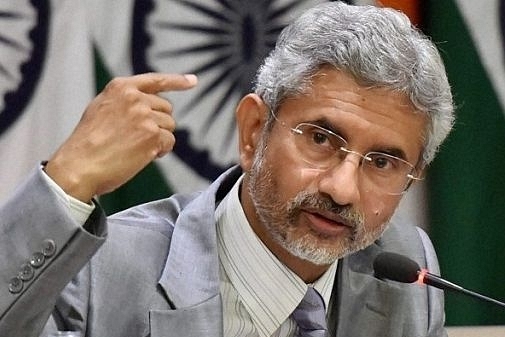
Fast-Track Projects & Counter China: Jaishankar’s Formula To Fix India-Nepal Ties
The 2015 ‘blockade’ of goods movement from India to Nepal had a serious fallout: PM Oli turned towards China, which was always waiting in the wings for such an opportunity.
EAM Jaishankar asked for a detailed review of all pending projects and devoted time and attention to put them on the fast track. The oil pipeline is a prime example of the fruition of Jaishankar’s efforts.
The joint inauguration of the Indo-Nepal petroleum pipeline by Prime Ministers Narendra Modi and K P Sharma Oli earlier this week marked a new beginning in India-Nepal ties that had been severely damaged a few years ago.
The Rs 350 crore, 69-kilometer long pipeline between Barauni in Bihar and Amlekhgunj in Nepal has been completed months ahead of schedule, and many more bilateral projects between the two countries are also set to be completed before schedule.
This outreach to Nepal involves wooing Nepal Prime Minister Oli.
Foreign policy mandarins overseeing South Asia in India’s Ministry of External Affairs (MEA) had developed an antipathy towards Oli after the 'Nepal Blockade' in 2015.
Nepal’s move to promulgate a new Constitution in 2015 triggered a massive agitation by the Madheshis. The new Constitution would have disenfranchised a huge number of Madheshis --- Nepalis living along the India-Nepal border who have close kinship ties with natives of Bihar and eastern Uttar Pradesh --- and reduced their political influence.
This agitation led to a complete halt in the movement of goods, including fuel, medicines and foodstuff, from India to Nepal. Oli, who was the Prime Minister of Nepal at the time, openly blamed India for imposing a blockade. Public sentiments in Nepal also turned against India as common people suffered.
The ill-advised ‘blockade’ had a serious fallout: Oli turned towards China, which was always waiting in the wings for such an opportunity.
China massively increased its footprints in Nepal and a number of MoUs for infrastructure projects, including a Nepal-China rail link, and supply of oil and essentials across the Himalayas, was signed between the two countries.
Ties between Oli and New Delhi further deteriorated when Oli had to resign after a constituent of the ruling alliance pulled out in mid-2016. Oli again blamed India for toppling his government.
But, India suffered a major setback and New Delhi’s influence started waning sharply after the surprise unification of the two major communist parties in Nepal --- one of them led by Oli.
After the unified communist party came to power following the 2017 elections in the Himalayan country, China elbowed India out of Nepal.
Unfortunately, instead of reaching out to Oli, many mandarins in South Block (housing the MEA) continued to be hostile towards the Nepal PM.
When S Jaishankar took over as the foreign minister, he identified bilateral projects as a priority area. “Almost all projects that India had committed itself to in Nepal were languishing and incurring massive time and cost overruns due to bureaucratic sloth and lack of strict oversight.
“That had been giving India a very bad name and the common man in Nepal formed a poor opinion of India as compared to China, whose projects in Nepal are always completed before schedule,” said a senior official in the MEA.
Immediately after taking over as minister, Jaishankar asked for a detailed review of all pending projects and devoted time and attention to put them on the fast track. The oil pipeline is a prime example of the fruition of Jaishankar’s efforts.
The project, first proposed in 1996, was put back on the table during Modi’s visit to Nepal in 2014. Though the agreement to execute the project was signed in August 2015, construction work started only in April 2018.
However, it was progressing at a slow pace. Jaishankar’s intervention led to about 50 per cent of the work, pending as of May this year, being completed in three months.
Pace of construction in the remaining projects being executed by India in Nepal, including construction of highways, hydro-power projects, irrigation canals and other infrastructure projects, has also picked up.
Prime Minister Modi referred to this while noting, during the joint inauguration of the pipeline, that he would be looking forward to inaugurating more such bilateral projects with Nepal in the ensuing months.
Another major change brought about by Jaishankar has been in the Indian foreign policy establishment’s antagonistic attitude towards Oli.
Many in the MEA had been banking on Oli demitting office in August next year as part of a power-sharing agreement (read this) with Pushpa Kamal Dahal, the leader of the other communist party that merged with Oli’s party.
Dahal is perceived to be closer to the Indian establishment and MEA officials felt biding time till Dahal’s take over of the Prime Ministership next year to reclaim lost ground in Nepal would be the best option before them.
Jaishankar, however, was of the firm opinion that Oli should be engaged with and should be weaned away from China. More so since there was no guarantee that Oli, the more powerful of the two communist leaders (the other being Dahal), would honour the ‘secret’ understanding with Dahal and step down in the latter’s favour.
Thus, over the past three months, interactions with Nepal at the official and unofficial levels have been stepped up.
It should be noted that before the 2015 ‘blockade’, Oli was perceived to be a ‘close friend’ of India even in Kathmandu’s political circles. Efforts over the past three months to woo him back are turning out to be fruitful, says MEA officials.
However, given the trust deficit that developed between the two countries since the 2015 ‘blockade’, New Delhi still has some way to go before the traditional warm ties with Kathmandu are fully established.